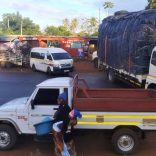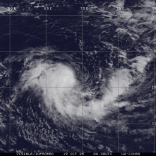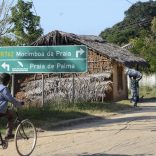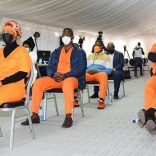Mozambique: Massinga toll blocked - Noticias report
Cabo Delgado: “Leaks” have been making it difficult to fight insurgents – investigator

A Mozambican investigator has told DW that “leaks” and “infiltrators” have made the fight against insurgents in Cabo Delgado more difficult. He also says that, in Macomia last week, FADM soldiers were killed by mistake.
A week ago, the town of Macomia, in the Mozambican province of Cabo Delgado, woke up to the sound of gunfire from armed insurgents. The attack lasted for three days, during which time the group ransacked commercial establishments using people as human shields, according to local reports.
On Sunday (31.05), the minister of National Defence, Jaime Neto, announced that the Defence and Security Forces (FDS) had shot dead 78 terrorists, including two Tanzanian leaders, and wounded another 60.
In an interview with DW Africa, Sérgio Chichava, a researcher at the Institute of Social and Economic Studies (IESE) in Maputo, says that that is not quite the full story, adding that several FADM soldiers were killed by mistake, since the insurgents wear the same uniforms, making it difficult to distinguish between friend and foe.
On Sunday, the government again failed to indicate the number of casualties on the Mozambican side and, in fact, there has been no mention of any casualties in the Mozambican armed forces since the insurgent attacks began in Cabo Delgado in October 2017.
The investigator also says that the “leaks” have been making it difficult to fight insurgents.
DW Africa: Does the death of the insurgents, announced by the Minister of National Defence, mean an end to the attacks in Cabo Delgado?
Sérgio Chichava (SC): Full stop? It is not certain that 78 insurgents were killed. There is scepticism in Mozambique about the figures put forward. What is certain is that the insurgents occupied the town [of Macomia] for about three days and left there of there own accord – they were not expelled by the Armed Forces.
What happened was that the Mozambican armed forces ambushed a road in an area called Nova Zambézia, in the 5º Congresso village, and that is where those those insurgent leaders were shot dead. As the insurgents wear the same uniform as the security forces, some FDS personnel were shot by helicopters which came to their aid, because it was difficult to distinguish who the enemy was.
DW Africa: Is there a danger of further attacks in the Macomia area?
SC: The risk of further attacks is enormous. We are now seeing reported in the press the arrival of air resources from South Africa to reinforce the combative capacity of the FDS. I don’t know what the impact of that is going to be, but it seems like information to be taken into account, and also that it could change the course of events. We do not expect the situation to improve that quickly, because there is also, within the Armed Forces, a certain disorganisation, which gives the insurgents leave to do what they are doing.
DW Africa: There are reports that insurgents have better weaponry than the Mozambican army. How then is a counterattack possible?
SC: We have been interviewing people on the ground fighting the insurgents. Many of them say that it is not that the insurgents are stronger than the Mozambican army, but that there is leakage of information, and a lot of infiltration. People say quite clearly that it is not possible to fight an enemy who already knows that we will attack the base on such a day, at such a time. It already knows our movements. It’s not possible.
On the other hand, the military are relatively unmotivated, in terms of logistical conditions on the ground and wage conditions. All of this needs to be resolved. As long as personnel are not resolved, the government will find it more difficult to deal with the insurgency.
DW Africa: IESE has investigated the existence of the Islamic extremist group “Al-Shabaab” in the region. What support does this group have?
SC: Our information from the field is that last week’s attacks in Macomia were carried out by the “Al-Shabaab”. It is quite difficult to know who is supporting these individuals. What is known is that there are a number of elements behind or financing the rebellion. There is talk of individuals who were previously linked to mining and who were violently expelled at the time when there was an implementation carried out in the company currently managing ruby mining in Montepuez. I believe this was in April 2017, some six months before the attack on Mocímboa da Praia.
But the “Al-Shabaab” story does not begin with the violence of the Mozambican state in 2017. Before that, in 2014-2015, in Cabo Delgado, there were individuals who were preaching an Islam different from the Islam that we know in Mozambique. An Islam that denied the existence of a secular state and that hoped to impose Sharia law, but through preaching and in a peaceful way.
The hypothesis that we’re putting forward is that what happened was a combination of factors, among those trying to impose this radical Islam – and that were not able to do this because they were rejected by the local Muslim leaders – and those doing the mining. And today it is also clear that within the “Al-Shabaab”, there are many people from Congo and Tanzania.
DW Africa: How has the insurgency been able to spread so far since the first attack in Cabo Delgado?
SC: The [Mozambican] state ignored the warnings before the attacks. There were many warnings from Islamic leaders, who said that something strange was going on. After the October 2017 attack, I think that the government did not take [the issue] seriously enough either. Dozens of people were arrested and the attacks only resumed some time later, starting in mid-2018. Only then did the government take it seriously.
DW Africa: Is the solution to close the province, as some analysts say?
SC: I think so, and, at least for a while, to declare a “state of siege” in Cabo Delgado. A little radicalism is needed to counter the situation. But what is also happening is that there is no active cooperation on the part of Tanzania in this matter, taking into account that there is evidence that Tanzanians who were wanted by the Tanzanian police for crimes committed there fled to Mozambique and joined the “Al-Shabaab”.
And another thing. The President of Tanzania, John Magufuli, was one of the presidents absent from the inauguration of [Mozambican] President Filipe Nyusi. Why? It seems there are issues between the leaders of the two countries that need to be resolved for there to be success in fighting the Cabo Delgado insurgency.












Leave a Reply
Be the First to Comment!
You must be logged in to post a comment.
You must be logged in to post a comment.